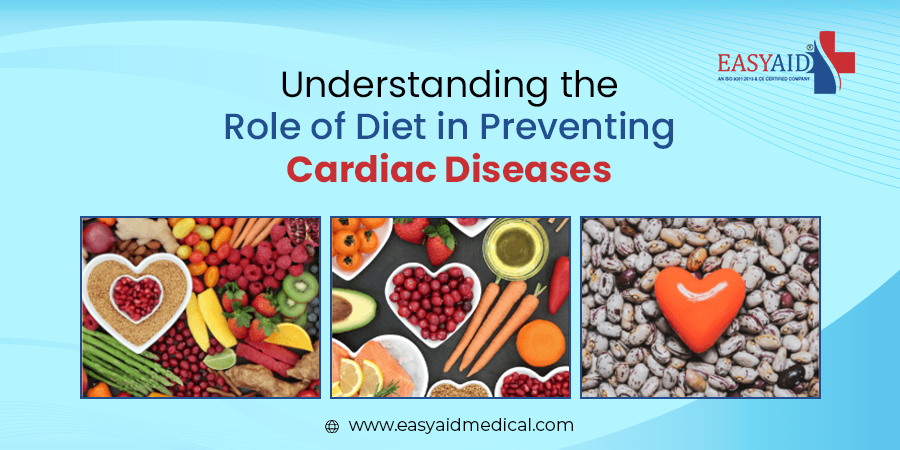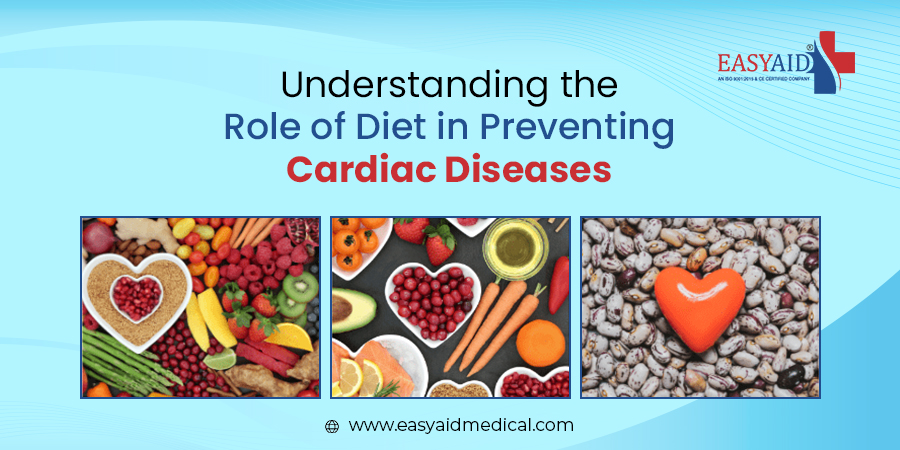Understanding the Role of Diet in Preventing Cardiac Diseases
A healthy diet is the only craving of your heart!
Living in the times of a fast-paced lifestyle has drastically increased cardiac diseases. Cardiac diseases also called cardiovascular diseases affect the heart and the blood vessels. Some of the many common conditions include arrhythmia, coronary heart disease, Peripheral Artery Disease, Congenital Heart Disease, Deep Vein Thrombosis, etc,
The Journal of American College of Cardiology reports that cardiac diseases have seen a drastic increase from 12 million in the ’90s to almost 20 million in recent years. According to the World Heart Federation, heart-related diseases account for more than 25% of deaths in India. This is a pathetic condition as these diseases are preventable just with a well-planned diet.
Yes! The remedy is in your kitchen.
However, let us first recognise the cause of heart-related diseases to rightly understand the role of diet in preventing cardiac diseases.

Causes of cardiovascular diseases
The core cause of cardiovascular diseases is the development of plaque in the blood vessels of the heart. Plaque is made up of fatty molecules, cholesterol and minerals and accumulates into the inner lining of the arteries. This wax-like plaque blocks the reaching of essential nutrients and oxygen to the heart.
Unhealthy Lifestyle and Plaque Development
According to the top 10 cardiologist in coimbatore, your everyday preferences profoundly influence your health, especially your heart. Unhealthy choices can easily develop cellular debris – narrowing and blocking the arteries. Some of the destructive choices are below.
Dietary Habits
Processed foods containing high saturated fats and cholesterol shoot up the bad LDL level and foster plaque formation. High sodium and low fibre intakes; excessive red meat and added sugars can increase the risk of coronary artery diseases.
Sedentary Living
Only indulging in regular physical activity can help optimal blood circulation leading to plaque buildup. Many professionals today sit for long hours ruining their health. It is high time now all realise building up an active lifestyle.
Smoking
Smoking is a potent catalyst for all kinds of heart-related diseases. Tobacco hosts many harmful substances that can damage the blood vessels. Inspite of knowing the harmful effects of smoking, many are addicted to smoking and some even consider it a status symbol.
Obesity
Weight management is very important according to everybest cardiology hospital in coimbatore. Being aware of one’s BMI and working to control it with proper diet and exercise can guard heart health. Poor health management is common these days across all age groups.
Impact of unhealthy lifestyle on heart
First, let us understand what is an unhealthy lifestyle according to the top 10 cardiologists of coimbatore.
It is all about taking alcohol in excess, unhealthy diet, smoking, lack of physical activity, depression and anxiety. All these habits can kill the soul and body of the person.
Alcohol
Excessive intake of alcohol can affect your heart in multiple ways. Some of the effects are as follows.
- Cardiomyopathy – Too much intake of alcohol weakens the heart’s muscle and this condition leads to less efficient blood pumping.
- Hypertension – Alcohol can contribute to the development of high blood pressure eventually increasing the risk of heart disease and stroke.
- Increased Triglycerides – These are fats that can accumulate in the blood due to excessive intake of liquor. This condition can harden and narrow the arteries hindering the flow.
- Weakened Immune System – Alcohol weakens the one’s immunity and makes the body susceptible to the immune system.
- Clot Formation – Alcohol can promote blood cot and can increase the risk of stroke and deep vein thrombosis.
Also Read – Why am I feel always sleepiness and how can I avoid it?
Unhealthy Diet
An unhealthy diet is another major factor that can contribute to ill heart health.
- High Cholesterol Levels – Food containing high saturated and trans fats usually found in fried foods, processed snacks and red meat can lead to LDL( low-density lipoprotein) cholesterol restricting blood flow.
- High Blood Pressure – Excessive salt intake can contribute to hypertension and this strains the heart blood vessels over time.
- Obesity – High-calorie and low-nutrient foods can contribute to obesity. This condition can increase the risk of heart ailments such as high blood pressure, high cholesterol, hypertension,etc.
- Type 2 Diabetes – Edibles high in refined sugars and carbohydrates can contribute to the development of type 2 diabetes. This can damage blood vessels can lead to atherosclerosis.
Smoking
This habit can have severe effects on your cardiovascular system. Chemicals in tobacco can lead to immediate and long-term cardio disorders.
- Coronary Artery Disease – This condition leads to the narrowing of coronary arteries reducing the flow of blood vessels. This can lead to angina causing frequent chest pain.
- Heart Rhythm Irregularities – The toxins of smoking can disrupt normal electrical signals leading to arrhythmias (irregular heartbeats).
- Atrial Fibrillation – This condition is caused by smoking which can lead to stroke and other cardiac issues.
- Reduced Oxygen Supply – Smoking decreases the oxygen-carrying capacity of the blood. This makes the heart work harder and pump blood to deliver oxygen to the body.
- Reduced Exercise Tolerance – Smoking reduces exercise tolerance making it difficult or more challenging for individuals to engage in physical activity.
Depression and Anxiety
The bond between mental health and heart health is complex and not understood completely. Continued depression and anxiety can lead to develop progression to cardio diseases.
- Hormonal Changes – Chronic stress can lead to increased stress hormones and this can have adverse effects on the cardiovascular system.
- Unhealthy coping mechanisms – Many people are easily carried away by unhealthy behaviours such as emotional eating, social isolation, etc. This can lead to the overactivation of the sympathetic nervous system.
Lack of physical activity
Poor blood circulation – It is a known fact that regular exercise promotes blood circulation. Blood is the medium to carry all required nutrients throughout the system and helping to pump it better is essential for the heart to work efficiently.
Insulin Resistance and Diabetes – Sedentary behaviour is directly connected with insulin resistance and increases the risk of heart attacks.
Decreased cardiovascular fitness – Regular exercise can strengthen the heart muscle, and improve blood circulation, ultimately increasing the efficiency of the cardiovascular system.
So now, how can diet solve this?
A proper diet is very important for nourishing the heart. It can help manage major factors such as high blood pressure, excess cholesterol levels and obesity. Read further to know the Havard recommended healthy heart diet.
Components of a Healthy Heart Diet
Fruits and Vegetables – As well-known, these are rich in vitamins, minerals and antioxidants. The high fibre content can control and regulate blood pressure, cholesterol levels, etc.,
Whole Grains – Whole grains contain fibres, vitamins, and minerals that are very much essential. Some of them include brown rice, oats, and quinoa.
Healthy fats – Healthy fats include unsaturated fats like Omega-3 fatty acids. These are found in fatty fish, olive oil, avocados, nuts and seeds.
Lean Proteins – Lean proteins are found in all legumes. It is a healthy alternative to the red meat and processed meats.
Limited Sodium Intake – This is possible by getting rid of processed food and packaged food.
Limited Added Sugars – Reduced consumption of sugary beverages, sweets and processed foods is a great way to guard health.
Portion Control – Though healthy, over-eating is always a problem. It is always good to be mindful of the quantity you are eating.
Regular exercise – Regular exercise can help the heart to be young for a longer period as it can rush blood to the system and remove debris.
Happy mind – Though it can be weird to include this point in a healthy diet, it is a very important point. Making sure that you are happy in your life and making choices that can save your mental health can ultimately lead to a healthy heart. Many best cardiologist hospital in coimbatore emphasize the same.
The above diet can regulate blood pressure, manage fat, control blood sugar levels, and help to maintain a healthy weight. Reading the blog, you should have now understood that a healthy heart needs a little thought on your diet.
Searching for good taste from healthy food choices is all you want to do for a healthy happy heart!


